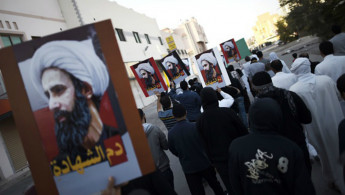Saudi accuses 30 local Shias of 'spying' for Iran
The majority of the accused come from Saudi Arabia's eastern region of Qatif, a Shia-majority area that has been scene of anti-government protests and local unrest.
The accused have been formally charged with forming a "spy ring" in collaboration with Iranian intelligence and seeking to recruit spies, according to Saudi's Bureau of Investigation and Prosecution.
Accusations against the defendants also include leaking highly sensitive information on Saudi military affairs, seeking to commit acts of sabotage against the kingdom's economic interests, inciting sectarian strife and participating in anti-government protests.
Saudi-owned media also reported that charges include committing of high treason against the king.
The suspects strongly deny the charges.
Many of the detainees were first arrested in 2013, and reports say they include among them an elderly university professor, a paediatrician, a banker and two clerics.
Saudi Arabia has often blamed unrest among its Shia community on Iranian meddling, but rarely presents evidence linking the Saudi protesters with Tehran.
Protestors in the Qatif reigon claim the Saudi government has waged a campaign of sectarian discrimination against them with government clerics often denouncing the local Shia population as "heretics" or fifth-columnists with allegiance to Iran.
The trial comes amid heightened tensions between Riyadh and Tehran, whose diplomatic ties were severed in January when protesters in Iran stormed the Saudi embassy, after the kingdom executed prominent Shia cleric Nimr al-Nimr.
Sheikh Nimr also hailed from the reigon of Qatif, and his own hometown of al-Awamiyya has been site of considerable tension between Saudi security services and the local population.





 Follow the Middle East's top stories in English at The New Arab on Google News
Follow the Middle East's top stories in English at The New Arab on Google News
![Israeli forces ordered bombed Gaza's Jabalia, ordering residents to leave [Getty]](/sites/default/files/styles/image_330x185/public/2176418030.jpeg?h=a5f2f23a&itok=_YGZaP1z)

